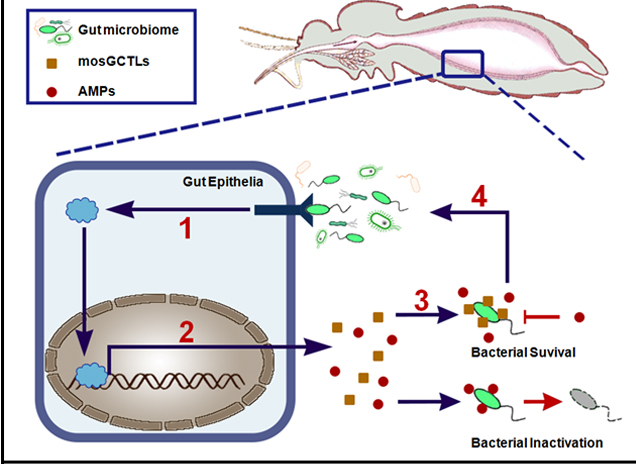Prof. Gong Cheng and his colleagues reveal a mechanism by which the mosquito symbiotic microbiome offsets gut immunity to achieve homeostasis
On March 14th, 2016, the study from the Gong Cheng lab of Tsinghua University School of Medicine entitled “Mosquito C-type lectins maintain gut microbiome homeostasis” was published online in Nature Microbiology. In this publication, the authors revealed the mechanism by which the insect symbiotic microbiome offsets gut immunity to achieve homeostasis. Prof. Gong Cheng is the corresponding author, and Dr. Xiaojing Pang who is a Postdoctoral Associate is the first author in this paper.

The long-term evolution between the host immune system and symbiotic bacteria determines their cooperative rather than antagonistic relationship. It is known that commensal bacteria have evolved a number of mechanisms to manipulate the mammalian host immune system and maintain homeostasis. Such intricate insect host-microbiome relationships in disease vector mosquitoes have lately received great attention due to their potential exploitation for disease transmission control. However, the strategies employed by the microbiome to overcome host immune responses in mosquito still remain to be understood.
In this study, Prof. Gong Cheng's lab reported that the gut microbiome in mosquitoes utilizes C-type lectins (mosGCTLs) to evade the bactericidal capacity of antimicrobial peptides (AMPs). Aedes aegypti mosGCTLs facilitate multiple bacterial colonization. Furthermore, maintenance of the gut microbial flora relies on the expression of mosGCTLs in A. aegypti. Silencing the orthologs of mosGCTL in another major mosquito vector (Culex pipiens pallens) also impairs the survival of gut commensal bacteria. The gut microbiome stimulates the expression of mosGCTLs which coats the bacterial surface and counteracts AMP activity. This research revealed a mechanism by which the commensal microbiome conquered constitutive immune activation, and furthermore might offer intervention targets for the control of vector-borne diseases in nature.
This work was funded by grants from the National Natural Science Foundation of China, the National Key Basic Research Program of MOST, Grand Challenges Explorations of the Bill & Melinda Gates Foundation, and the National Institute of Health of the United States. Prof. Gong Cheng is a Newton Advanced Fellow awarded by the Academy of Medical Sciences and the Newton Fund.
The paper links: http://www.nature.com/articles/nmicrobiol201623

